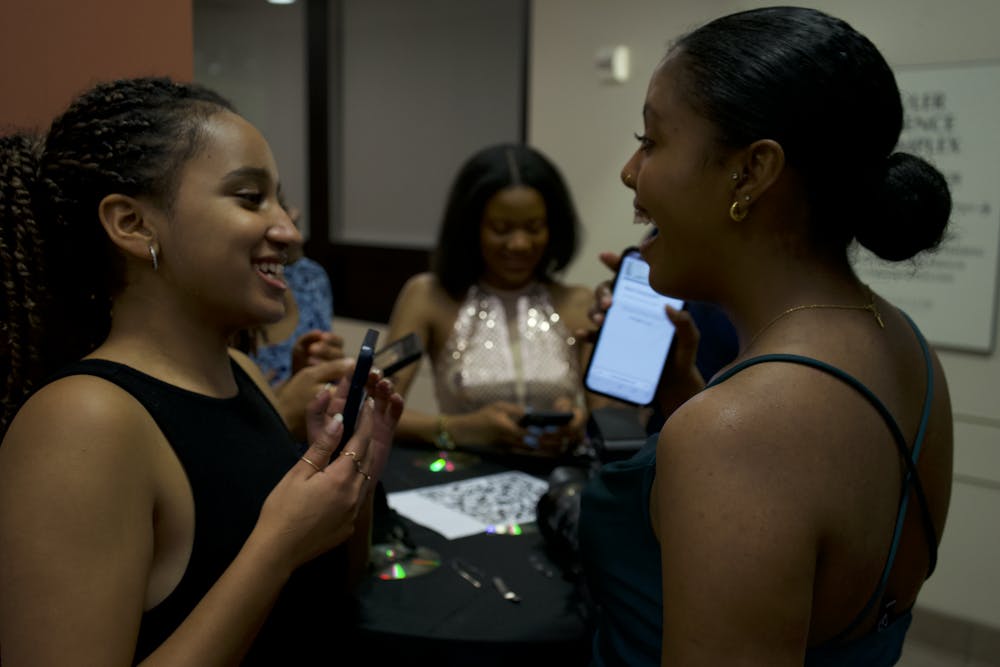This February, Taylor University gathers with millions of other people to celebrate Black History Month. Across campus, students and faculty celebrate Black culture and excellence.
“What it means to me is – It means everything to me,” Sophomore Nathaniel Kooi, co-president of Taylor’s Black Student Union (BSU), said. “It’s a month where we’re able to celebrate my culture and everybody else who’s African American and Black… It’s just an empowering month for us.”
Kooi and BSU Co-President Zayda Strother worked to host multiple events over the course of February, starting with Empowering Black Joy, which took place Feb. 1–3.
The event started with Uplifting Black Businesses on Feb. 1. BSU hosted Black small business owners at the LaRita Boren Campus Center. On Feb. 2, BSU partnered with IFC to put on the movie showing of “Just Mercy.” Empowering Black Joy was wrapped up on Feb. 3 with a BSU dinner night centered around Ethiopian food.
BSU continued the celebration with Black Out Night on Feb. 9. Participants went to 2nd Euler dressed in black and enjoyed music, dancing, food, and fellowship.
On Feb. 17, speakers Craig Cochran, director of the counseling center, and Pastor Leah Britten, worship leader at Destiny Church, gave a message at the BSU Gala celebrating all Black students on campus.
Under the direction of Maribel Magallanes, director of student leadership and cultural programs, Kooi and Strother organized these events and are preparing for the Expressions event on Feb. 29.
Kooi hopes to make BSU a place where Black students can find community, but he also wants people to know it’s open to everyone. He is invested in welcoming others and having unity on campus.
“How I would encourage others to celebrate this month is open up their mind and their heart,” Kooi said. “Be willing to learn more. Be willing to go up to somebody who is Black and understand their story. Understand and want to know more about their background.”
Tia Cavanaugh-Goggans, director of intercultural initiatives and programs, also encouraged all students to reach out to Black students, make friends, and learn about someone who doesn’t look like you.
Jesus said to love all men, which means that embracing diversity and having a Christ-like view of the world are inseparable, she said.
“God is the author of diversity,” Cavanaugh-Goggans said. “We didn’t create ourselves. He created each of us in his own image for his glory. And wouldn’t it be a boring world if we all looked the same and had the same gifts and talents?”
To her, Black History Month at Taylor University is about spreading knowledge and bringing awareness.
Magallanes worked with her office manager, Goodness Korrie, to celebrate specific Black people through the email announcements. They highlighted Black historical figures for the first few weeks of February, and the last two weeks will be dedicated to Taylor University’s Black faculty and students.
“For Black History Month, we get to honor the Black students, faculty, and staff at Taylor and remind them of their dignity and value in Christ and how much we appreciate them,” Magallanes said.
Cavanaugh-Goggans said her vision is to spread awareness and educate people on the culture and how African Americans have contributed to society. She said she wants to spread knowledge about the food, the people, the music, and the excellence within Black culture.
Cavanaugh-Goggans encouraged others to find a vein of Black history that interests them and to pursue it through books and online resources.
The Zondervan Library has many good resources for pursuing an interest in Black history. They have a few bookshelves dedicated to Black authors and rotate through different books every few weeks. They have novels, biographies, poetry, books, and more. A plethora of knowledge and exploration is available to all.
As February wanes and March draws closer, it is good to remember that Black history and culture don’t merely exist in these 29 days. They are a constant part of our lives.
This month is taken to highlight the history we are living every day, she said. We get to choose how to live and what our story will be.
“What will your history be?” Cavanaugh-Goggans said. “Will your history be majority culture history, or will it be all of our history? What will your chapter in the book look like?”





